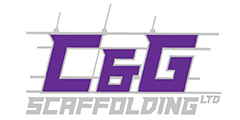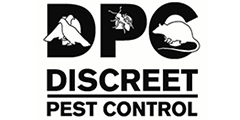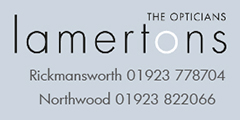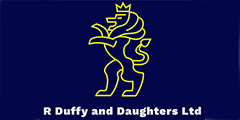CLUB RULES
Note that the club rules are are currently being updated.
A replacement set of senior club rules will be posted here once ratified and approved.
Preliminary
The name of the Club shall be the Northwood Football Club.
The Club room and headquarters of the Club shall be at Ground Floor, the Clubhouse, Northwood Recreation Ground, Chestnut Avenue, Northwood, Middlesex, or at such other address as the Club may in General Meeting determine.
The objects of the Club shall be to encourage, develop and promote football and other sporting activities, together with social activities to further goodwill amongst its members.
The Club shall be a Members Club and shall consist of playing members and non-playing members together with such Vice Presidents, Honorary Members and temporary members as are hereinafter mentioned.
(a) The Club colours shall be red and white.
(b) The Club shall have the status of an Affiliated Member Club of The Football Association by virtue of its affiliation to/membership of The Football Association. The rules and regulations of The Football Association Limited and parent County Association and any League or Competition to which the Club is affiliated for the time being shall be deemed to be incorporated into the Club Rules.
(c) The Club will also abide by the Football Association’s Child Protection policies and Procedures, Codes of Conduct and the Equal Opportunities and Anti-Discrimination Policy.
Membership
Every candidate for membership must be proposed by one member of the Club and the proposal must be seconded by another member, both the proposer and the seconder being members and both vouching for the candidate’s fitness for membership. Election to membership shall be either by the Club in General Meeting, or by the General Committee of the Club. No reasons shall be given to any candidate in the event of his rejection.
Persons may not be admitted to membership or be admitted as candidates for membership to any privileges of membership without an interval of at least two days between their nomination or application for membership and their admission. Persons becoming members without prior nomination or application may not be admitted to the privileges of membership without an interval of at least two days between their becoming members and their admission.
No person shall be admitted to membership until having been elected, he shall have paid to the Treasurer his first annual subscription.
Playing and non-playing members together with Vice Presidents and Honorary members shall have full voting rights and be eligible to hold office on any committee of the Club.
Vice Presidents and Honorary members, who shall not be liable to pay any subscription but shall be entitled to all the privileges of membership may be elected by the Club in General Meeting.
All visiting teams and their supporters may be admitted as temporary members for the day of a pre-arranged match, so that they may enjoy all the privileges of membership for that day.
Temporary members and persons under 18 years of age shall not have voting rights nor be eligible to hold office on the General Committee.
New Structure Committee And Officers from 2014
The affairs of the Club, in all matters not in these Rules reserved for the Club in General Meeting, shall be managed by the General Committee of the Club.
The General Committee shall consist of not less than 5 nor more than 15 members of the Club who shall be elected at the Annual General Meeting of the Club. The position of Chair can be elected for a period of up to three years. A President can be elected for Life. All other members of the General Committee shall go out of office each year but are eligible for re-election in the following year. Five members shall constitute a quorum of the General Committee.
The full adopted structure of the club shall be:
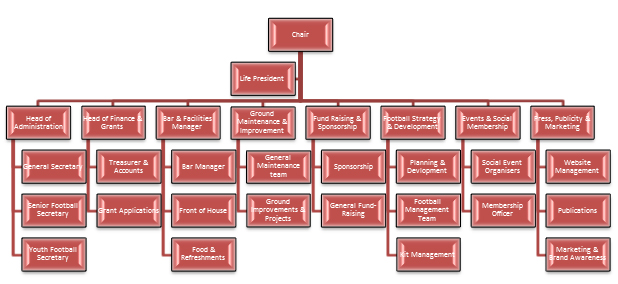
The General Committee shall be constituted as follows:
President, Chair, Head of Administration, Head of Finance & Grants, Bar & Facilities Manager, Fund Raising & Sponsorship Manager, Ground Maintenance & Improvements Manager, Events & Social Membership Manager, Head of Press, Publicity & Marketing, Head of Football Strategy & Development, General Secretary, Senior Football Secretary and Youth Football Secretary while all other roles within the structure can also be invited to attend meetings when required.
Each of the Heads of the different areas may have separate Sub-Committee meetings with the support people in each area as deemed appropriate and then report back to the General Committee. Two members shall constitute a quorum of each Sub-Committee.
The General Committee shall have the power to deal with any matter not provided for in these Rules and make bye-laws and regulations for the better management and control of the activities and affairs of the Club.
The General Secretary, the Treasurer and every such Officer shall act in all matters in accordance with the directions of the General Committee of the Club. Subject to any directions given to him by the General Committee, the Chair or General Secretary may, on behalf of the Club, engage domestic staff and other Club servants as may be necessary for the efficient and economical running of the Club and may lawfully terminate any such engagement.
The General Committee shall have power to appoint a member to fill any vacancy on the Committee until the next Annual General Meeting. Any member so appointed shall retire at the next Annual General Meeting but shall be eligible for election as a member of the General Committee at such meeting.
Not less than 28 days before the date of the Annual General Meeting the Club Secretary shall post notice of the names and addresses of those persons retiring from the General Committee in every year. For the purpose of election to the General Committee, any two members may nominate a candidate by notice in writing to the Secretary not less than 14 days before the meeting, and the Secretary shall post every such nomination in the Clubhouse before the meeting.
Meetings of the Club General Committee shall be held at such time as the Committee shall determine.
The Club General Committee shall be empowered to co-opt any member of the Club temporarily or permanently to advise on technical or practical matters or to undertake specific duties. Members co-opted under this rule shall not be entitled to vote at General Committee meetings unless they have been co-opted onto the General Committee.
At all meetings of the General Committee, the Chair shall take the meeting or in his absence, the meeting shall elect a Chairman.
General Meetings
The Annual General Meeting of the Club shall be held between 31 May and 1 September inclusive in each year, and within fifteen months of the preceding Annual General Meeting. The business of the Annual General Meeting shall be:
(a) to adopt the Minutes of the previous year’s Annual General Meeting
(b) to adopt the audited accounts of the Club
(c) to elect Auditors for the year ensuing
(d) elections to the General Committee for the year ensuing in which written nominations shall be forwarded to the Club Secretary.
(e) to present any other business of which due notice has been received by the General Secretary in writing at least 14 days prior to the meeting.
Notice of the day and time of the Annual General Meeting shall be posted in the Clubhouse for a period of at least 28 days before such day. A General Meeting of the Club may be summoned at any time by the General Committee, and shall be so summoned within seven days of receipt of a written request in that behalf by not less than fifteen members or one fifth of the Club Membership, whichever is the less. A General Meeting shall be summoned by causing a notice thereof to be posted in the Club premises. The period of notice required before the day appointed for the General Meeting may be abridged in the discretion of the General Committee if the urgency of the business to be discussed in their opinion so requires.
At any General Meeting of the Club, every member of the Club shall be entitled to be present, and every paid-up ordinary or honorary member shall be entitled to one vote upon every question raised. The Club Secretary shall take Minutes of the proceedings at all general meetings of the Club.
At all meetings of the Club, except as otherwise stated in these rules, resolutions shall be carried by the majority of those present and entitled to vote.
Finance
Playing and non-playing members of the Club shall pay an annual subscription of such an amount as may be determined by the Club in General Meeting and shall be paid by a date to be decided by the General Committee.
The Treasurer shall receive all monies due to the Club and shall make payment on its behalf in accordance with these rules and any procedure decided by the General Committee. The Treasurer shall keep full and proper accounts of such monies and shall present a duly audited statement of account at each Annual General Meeting and at such other times as may be required by the General Committee.
A banking account or accounts shall be opened in the name of the Club at such Bank or Banks as the General Committee may determine.
All cheques drawn on such accounts shall be signed by two officers, namely, the Treasurer, General Secretary or the Chair. When making payments by electronic methods, the Treasurer shall be able to authorise payments.
The accounts of the Club shall be audited annually by honorary Auditors, elected at the Annual General Meeting. Auditors shall not be members of the General Committee, and the Club’s financial year shall end at such time as the General Committee may determine.
Except as provided for in these Rules or by direct authorisation of the General Committee recorded in the Minutes, no member may pledge the credit of the Club.
(a) The Committee shall be empowered to borrow for the purposes of the Club such amount of money either at one time or from time to time and at such rate of interest and in such form and manner upon such security as required by the Club and the Trustees shall at the direction of the Committee make all such dispositions of the Club property or any part of the Club property and enter into such agreements in relation to the Club property as the Committee may deem proper for giving security for such loan and interest.
(b) All existing borrowing at the Bank is to be regarded as sanctioned under this rule.
Development Plan
The Club will adopt a Development Plan designed to encourage and promote youth football development with set targets for promotion to senior football. To be reviewed in accordance with set timescales.
Visitors
Members may introduce and entertain guests at the Club and there shall be kept at the Club premises a visitors Book which both the member and his guest shall sign. The member introducing a guest shall be responsible for his guest strictly observing these Rules and the Club by-laws and shall not leave the Club premises before his guest provided that no member shall introduce more than two guests at any one time, and that no person whose membership of the Club has been terminated or whose application for membership has at any time been rejected, shall be introduced as a guest. No person shall be introduced as a guest more than twice in one calendar month. The General Committee may make such arrangements as are necessary to introduce guests for specific functions.
Club Hours And Intoxicating Liquor
The Club premises shall be opened at hours determined by the General Committee. The General Committee shall be empowered to close the premises to the members at such time as the General Committee may from time to time determine subject to 28 days written notice to be posted at the Club premises.
The supply of intoxicating liquor in the Club premises shall be permitted during prescribed hours.
Notices
Each member shall keep the Club Secretary informed of that member’s private address, or of some other address at which communications may be addressed to him. All notices shall be posted by being affixed in a prominent position on the Club premises in a part of the Club which is frequented by members, and it shall be the duty of the Honorary Secretary to endeavour to ensure that any such notice remains so exhibited throughout any period required in that behalf by or under these Rules.
Misconduct
If the conduct of any member be, in the opinion of the General Committee, contrary to the aims and objectives of the Club, or likely to embarrass the Club or its members, such members shall be given notice to attend a meeting of the General Committee to offer an explanation.
If such explanation is not acceptable to the General Committee or the member fails to attend, the member may be called upon to resign, or may be expelled, censured or suspended for a specific period by a resolution passed by a majority vote at that meeting.
Gross Misconduct
If the conduct of any member be, in the opinion of the General Committee, more significant and likely to result in a charge of Gross Misconduct, the member can also be suspended in the interim period by designated powers granted to at least two members of the General Committee usually Chair and General Secretary. That or those members will be written to, explaining the reasons within a reasonable time and that member will be offered the opportunity to explain their actions to the committee at the next full committee meeting which shall take place no longer than 60 days following the letter.
If such explanation is not acceptable to the General Committee or the member fails to attend, the member may be called upon to resign, or may be expelled, censured or suspended for a specific period by a resolution passed by a majority vote at that meeting.
Alterations Of Rules
These Rules may be revoked, added to or altered by a majority comprising of two thirds or more of the members present and entitled to vote at any General Meeting of the Club of which notice has been duly given in accordance with Rule 20 specifying the intention to propose the revocation, addition or alteration, together with full particulars thereof.
Exclusions Of Liability
Neither the Club nor any Officer thereof shall be liable to any member or guest of a member for any loss of or damage to any property occurring, from whatever cause, in or about the Club premises, nor for any injury sustained by any member or guest whilst on, entering or leaving the Club premises, and a notice to this effect will at all times be displayed in a prominent position on the Club premises.
Trustees
There shall be at least two and not more than three Trustees of the Club who shall be appointed from time to time as necessary by the Club in General Meeting from among the members who are willing to be so appointed. The Trustee shall hold office during his life, or until he shall resign by Notice in writing given to the General Committee, or until a resolution removing him from office shall be passed at a General Meeting of the Club by a majority compromising two thirds of the members present and entitled to vote.
All property of the Club, including land and investments, shall be held by the Trustees for the time being, in their own names so far as necessary and practicable, for the use and benefit of the Club. On the death, resignation, or removal from office of a Trustee, the General Committee shall take steps to procure the appointment by the Club in General Meeting of a new Trustee in his place; and shall as soon as possible thereafter take all lawful and practicable steps to procure the vesting of all Club property into names of the Trustees as constituted after the said appointment.
The Trustees shall in all respects act, in regard to any property of the Club held by them, in accordance with the directions of the General Committee; and shall have power to sell, lease, mortgage or pledge any Club property for the purpose of raising or borrowing money for the benefit of the Club in compliance with the General Committee’s directions. The purchaser, lessee or mortgagee shall be concerned to enquire when any such direction has been given.
The first Trustees of the Club shall be appointed by the General Committee.
The Trustees of the Club shall hold office in the Northwood Sports Association.
Dissolution
If at any general meeting a resolution for the dissolution of the Club shall be passed by a majority comprising of two thirds or more of the members present and entitled to vote, the Committee shall thereupon, or at such future date as shall be specified in such resolution, proceed to realise the property of the Club and after the discharge of all liabilities shall dispose of any balance remaining in their hands as the Club in general meeting shall resolve.
APPENDIX 1
Code of Conduct For Coaches
Coaches are key to the establishment of ethics in football. Their concept of ethics are how their attitude directly effects the behaviour of players under their supervision. Coaches are, therefore, expected to pay particular care to the moral aspect of their conduct.
Coaches have to be aware that almost all of their everyday decisions and choices of actions, as well as strategic targets, have ethical implications.
It is natural that winning constitutes a basic concern for coaches. This code is not intended to conflict with that. However, the code calls for coaches to disassociate themselves from a “win-at-all-costs” attitude.
Increased responsibility is requested from coaches involved in coaching young people. The health, safety, welfare and moral education of young people are a first priority, before the achievement or the reputation of the Club, school, Coach or Parent.
Set out below is The F.A. Coaches Association Code of Conduct (which reflects the standards expressed by the National Coaching Foundation and the National Association of Sports Coaches) which forms the benchmark for all involved in coaching:
- Coaches must respect the rights, dignity and worth of each and every person and treat each equally within the context of the sport.
- Coaches must place the well-being and safety of each player above all other considerations, including the development of performance.
- Coaches must adhere to all guidelines laid down by governing bodies.
- Coaches must develop an appropriate working relationship with each player based on mutual trust and respect.
- Coaches must not exert undue influence to obtain personal benefit or reward.
- Coaches must encourage and guide players to accept responsibility for their own behaviour and performance.
- Coaches must ensure that the activities they direct or advocate are appropriate for the age, maturity, experience and ability of players.
- Coaches should, at the outset, clarify with the players (and, where appropriate, parent) exactly what is expected of them and also what they are entitled to expect from their coach.
- Coaches must co-operate fully with other specialists (e.g. other coaches, officials, sports scientists, doctors, physiotherapists) in the best interests of the player.
- Coaches must always promote the positive aspects of the sport (e.g. fair play) and never condone violations of the Laws of the Game, behaviour contrary to the spirit of the Laws of the Game or relevant rules and regulations or the use of prohibited substances or techniques.
- Coaches must consistently display high standards of behaviour and appearance.
- Coaches must not use or tolerate inappropriate language.
- Make every effort to develop their own sporting abilities, in terms of skill, technique, tactics and stamina.
- Give maximum effort and strive for the best possible performance during a game, even if his team is in a position where the desired result has already been achieved.
- Set a positive example for others, particularly young players and supporters.
- Avoid all forms of gamesmanship and time-wasting.
- Always have regard for the best interests of the game, including where publicly expressing an opinion on the game and any particular aspect of it, including others involved in the game.
- Not use inappropriate language.
- Make every effort consistent with Fair Play and the Laws of the Game to help his own team win.
- Resist any influence which might, or might be seen to, bring into question his commitment to the team winning.
- Know and abide by the Laws, rules and spirit of the game, and the competition rules.
- Accept success and failure, victory and defeat, equally.
- Resist any temptation to take banned substances or use banned techniques.
- Treat opponents with due respect at all times, irrespective of the result of the game.
- Safeguard the physical fitness of opponents, avoid violence and rough play, and help injured opponents.
- Accept the decision of the Match Official without protest.
- Avoid words or actions which may mislead a Match Official.
- Show due respect towards Match Officials.
- Abide by the instructions of their Coach and Team Officials, provided they do not contradict the spirit of this Code.
- Show due respect towards the Team Officials of the opposition.
- Show due respect to the interests of supporters.
- Set a positive example for others, particularly young players and supporters.
- Promote and develop his own team having regard to the interest of the Players, Supporters and reputation of the national game.
- Share knowledge and experience when invited to do so, taking into account the interest of the body that has requested this rather than personal interests.
- Avoid all forms of gamesmanship.
- Show due respect to Match Officials and others involved in the game.
- Always have regard for the best interests of the game, including where publicly expressing an opinion of the game and any particular aspect of it, including others involved in the game.
- Not use or tolerate inappropriate language.
- Make every effort to develop the sporting, technical and tactical levels of the club/team, and to obtain the best results for the team, using all permitted means.
- Give priority to the interests of the team over individual interests.
- Resist all illegal or unsporting influences, including banned substances and techniques.
- Promote ethical principles.
- Show due respect for the interests of the players, coaches and officials, their own club/team and others.
- Show due respect for the interests of supporters.
- Accept the decisions of the Match Official without protest.
- Avoid words or actions which may mislead a Match Official.
- Show due respect towards Match Officials
- Children enjoying football
- A sense of personal achievement
- Self-esteem
- Improving the child’s skills and techniques.
- Other players
- Officials
- Managers
- Spectators
- Encourage parents / spectators to:
- Applaud the opposition as well as your own team.
- Avoid coaching the child during the game.
- Not to shout and scream.
- Respect the referee’s decision.
- Give attention to each of the children involved in football not just the most talented.
- Give encouragement to everyone to participate in football.
- Ensure that parents / spectators within your club agree and adhere to your club’s Code of Conduct and Child Protection Policy.
- The advertisement for volunteers
- The selection of candidates for volunteers
- Courses
- External coaching and education activities and awards
- Football development activities
- Selection for teams
- Appointments to honorary positions
- Details of what, when, and where the occurrence took place.
- Any witness statement and names.
- Names of any others who have been treated in a similar way.
- Details of any former complaints made about the incident, date, when and to whom made.
- A preference for a solution to the incident
- Warn as to future conduct
- Suspend from membership
- Remove from membership
Code Of Conduct For Players
Players are the most important people in the sport. Playing for the team, and for the team to win, is the most fundamental part of the game. But not winning at any cost - Fair Play and respect for all others in the game is fundamentally important. This code focuses on players involved in top-class football. Nevertheless, the key concepts in the Code are valid for players at all levels.
Obligations towards the game
A player should:
Obligations towards one’s own team
A player should:
Respect for the Laws of the Game and competition rules
A player should:
Respect towards Opponents
A player should:
Respect towards the Match Officials
A player should:
Respect towards Team Officials
A player should:
Obligations towards the Supporters
A player should:
Code of Conduct for Team Officials
This Code applies to all team/club officials (although some items may not apply to all officials).
Obligations towards the Game
The Team Official should:
Obligations towards the Team
The Team Official should:
Obligations towards the Supporters
The Team Official should:
Respect towards the Match Officials
A Team Official should:
Code of Conduct for Parents / Spectators
Parents / Spectators have a great influence on children’s enjoyment and success in football. All children play football because they first and foremost love the game - its fun. It is important to remember that however good a child becomes at football within your club it is important to reinforce the message to parents / spectators that positive encouragement will contribute to:
A parent and spectator’s expectations and attitudes have a significant bearing on a child’s attitude towards:
Ensure that parents and spectators within your club are always positive and encouraging towards all of the children not just their own.
Anti Discrimination Policy For Clubs
Northwood Football Club is responsible for setting standards and values to apply throughout the club at every level. Football belongs to and should be enjoyed by everyone, equally. Our commitment is to confront and eliminate discrimination whether by reason of sex, sexual orientation, race, nationality, ethnic origin, colour, religion or disability.
Equality of opportunity at Northwood Football Club means that in all our activities we will not discriminate or in any way treat anyone less favourably, on grounds of sex, sexual orientation, race, nationality, ethnic origin, colour, religion or disability. This includes:
Northwood Football Club will not tolerate sexual or racially based harassment or other discriminatory behaviour, whether physical or verbal, and will work to ensure that such behaviour is met with appropriate action in whatever context it occurs.
Northwood Football Club is committed to the development of the programming of ongoing training and awareness raising events and activities, in order to promote the eradication of discrimination within its own organisation, and within football as a whole.
Each Youth Player and their parent or guardian will be expected to sign a Code Of Conduct; the current version is as follows:
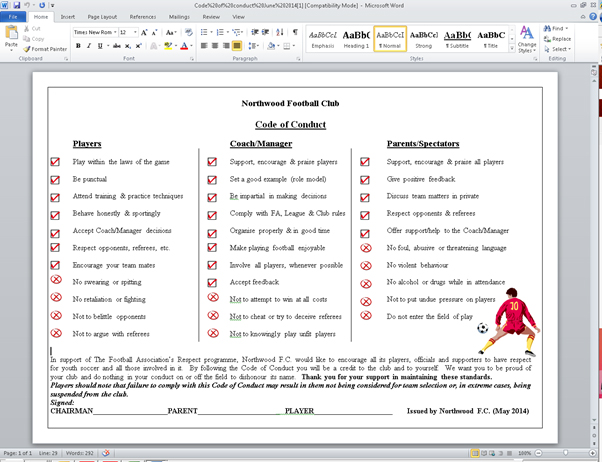
Equal Opportunities Policy For Clubs
General
Northwood Football Club is committed to a policy of equal treatment of all members and requires all members of whatever level or authority, to abide and adhere to this general principle and the requirements of the Codes of Practice issued by the Equal Opportunities Commission and Commission for Racial Equality.
All members are expected to abide by the requirements of the Race Relations Act 1976, Sex Discrimination Act 1986 and Disability Discrimination Act 1995. Specifically discrimination is prohibited by:
Treating any individual on grounds of gender, colour, marital status, race, nationality or ethnic or national origin, religion, sexual orientation or disability less favourably than others.
Expecting an individual solely on the grounds stated above to comply with requirement(s) for any reason whatsoever related to their membership, which are different from the requirements for others.
Imposing on individual requirements which are in effect more onerous on that individual than they are on others. For example, this would include applying a condition which makes it more difficult for members of a particular race or sex to comply than others not of that race or sex.
Victimisation of an individual
Harassment of an individual, by virtue of discrimination
Any other act or omission of an act, which has as its effect the disadvantaging of a member against another, or others, purely on the above grounds. Thus, in all the Club’s recruitment, selection, promotion and training processes as well as disciplinary matters, it is essential that merit, experience, skills and temperament are considered as objectively as possible.
Northwood Football Club commits itself to the immediate investigation of any claims of discrimination on the above grounds and where such is found to be the case, a requirement that the practice cease forthwith, restitution of damage or loss (if necessary) and to the investigation of any member accused of discrimination.
Any member found guilty of discrimination will be instructed to desist forthwith. Since discrimination in its many forms is against the Football Club’s policy, any members offending will be dealt with under the misconduct procedure at para 38 of the Club Rules.
The Football Club commits itself to the disabled person whenever possible and will treat such members, in aspects of their recruitment and membership, in exactly the same manner as other members. The difficulties of their disablement permitting assistance will be given, wherever possible to ensure that disabled members are helped in gaining access. Appropriate training will be made to such members who request it.
Club Complaints Procedure
In the event that any member feels that he or she has suffered discrimination in any way, or that the Club Policies, Rules or Code of Conduct has been broken, he or she should follow the procedures below.
They should report the matter to the Club Secretary or another member of the Committee.
Your report should include:
The Club’s General Committee will sit for any hearings that are requested.
The Club’s General Committee will have the power to:
January 2015




